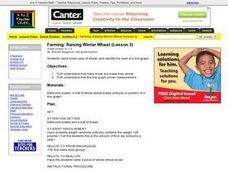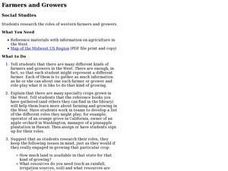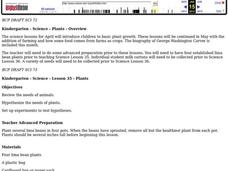Curated OER
Field Of Beans
Young scholars investigate the concept of crop farming. They plant small fields to test different theories of agriculture. Students keep care over the fields, including pest and weed control. Young scholars make and record daily...
Curated OER
Bioterrorism
Students investigate the problem of bioterrorism. The goal of the lesson is to prepare them for possible emergencies. The teacher has the freedom to add to the lesson in the form of supplemental information as needed. Students can...
Curated OER
Designer Agriculture
Pupils investigate the controversial issue of genetic engineering. They research the pros and cons of such technology and apply it to creating new plants or crops for the area of Alaska. Students think of new types of animals and draw...
Curated OER
Earth's Valuable Soil
Students investigate the concept of how the earth is segmented into different parts. They use an apple as a model to display the different layers. The apple is divided into different fractions by being cut into different size pieces.
Curated OER
What Is On Your Plate?
Students investigate the type of foods that are grown in Alaska. The introduction gives the justification, facts, and statistics to be shared with students. They draw and chart the many different types of food that can be eaten in one...
Curated OER
From Bolls To Bolts
Students investigate the concept of cotton manufacturing. The skills of setting statements in chronological order is developed. They are shown pictures of products and place them in order. The lesson includes background information for...
Curated OER
Farming as a Way of Life
Sixth graders research the development of various agriculture techniques. Using this information, they determine how this led to the domestication of plants and animals and how other occupations were considered. They discuss the...
Curated OER
Land Use in New Hampshire: Farming
Students examine how the environment as affected people farming in New Hampshire. They visit a field trip to a local farm to make observations. They create a poem based on their observations.
Curated OER
Farming the Southern Colonies
Seventh graders investigate the basis for farming choices in the early colonies by using group research and discussion. Each group researches a topic that they write about and present to the rest of the class.
Curated OER
Farming: Raising Winter Wheat (Lesson 3)
Students identify foods that are made from wheat. They use a line graph to explain measurement. They identify foods from the food groups and explain how temperature, prefcipitation and natural resources affect the growth of wheat.
Curated OER
What In The World Is A Harrow?
Students explain the values farming and industry have on the economy of Kansas. They research farm equipment uncluding price, types and purpose. They write a report about farm equipment.
Curated OER
Farmers and Growers
Students explore the lives and work of the farmers and growers of specialty crops of the West. The amount of land and natural resources needed, the fertilizers utilized, and the market available for the crops are investigated in this...
Curated OER
Down on the Farm
Young scholars are introduced to a map of an Illinois farm. They determine whether the map is of the past, present, or future by looking at features on the map. They also use the map to make a three-dimensional model.
Curated OER
Plants
Students review the needs of animals, hypothesize the needs of plants, and set up experiments to test hypotheses.
















